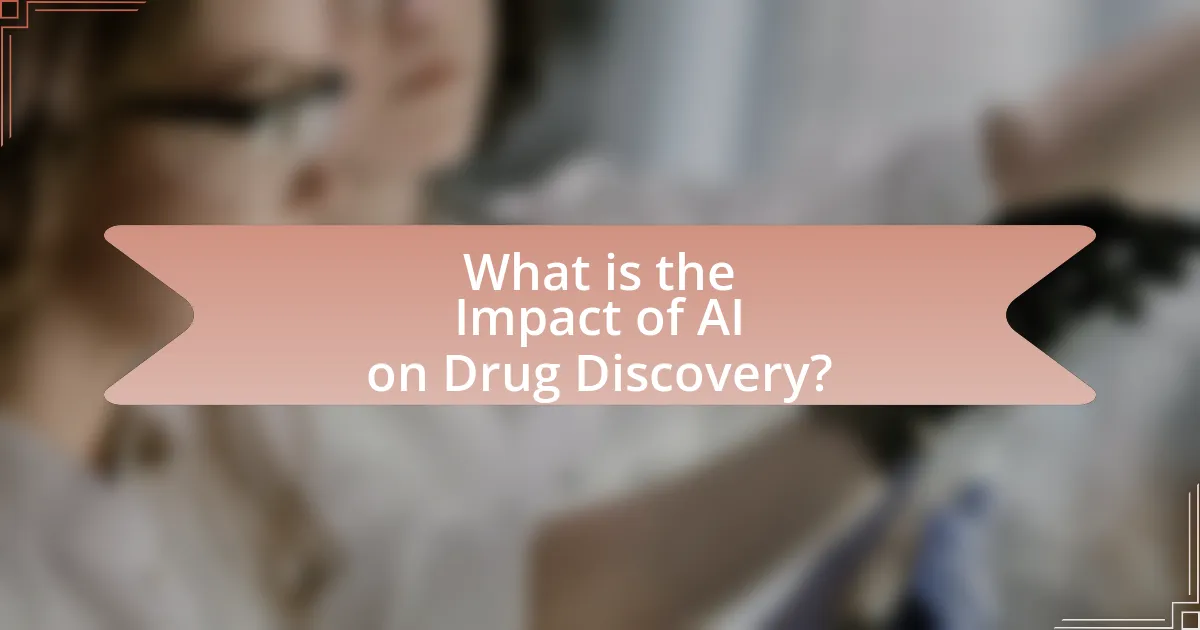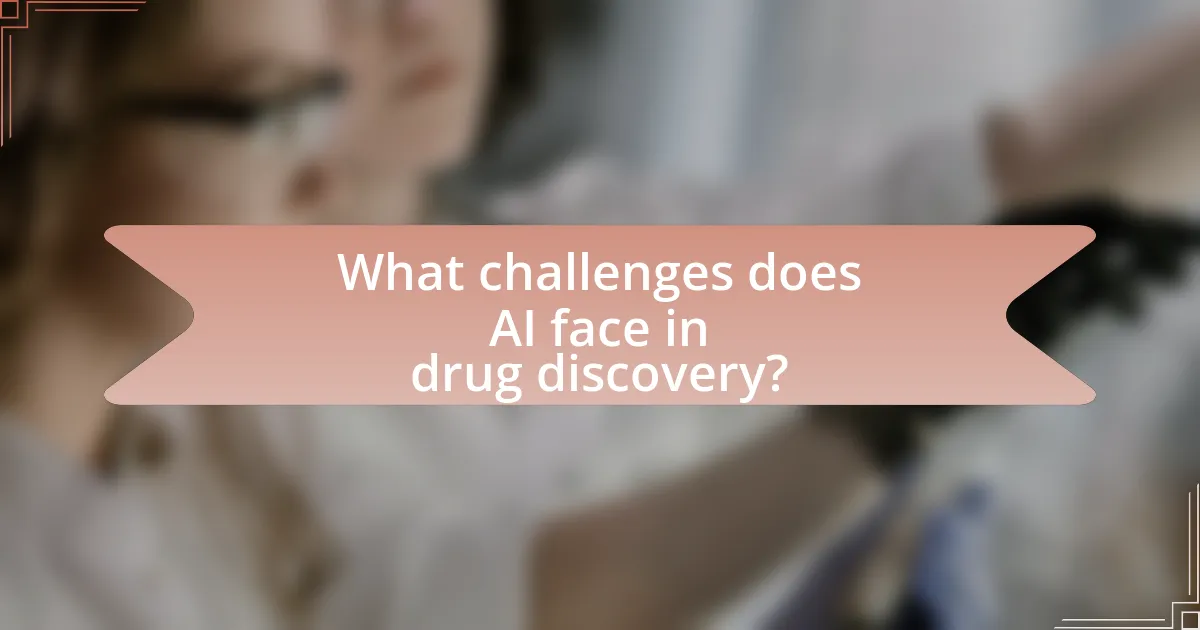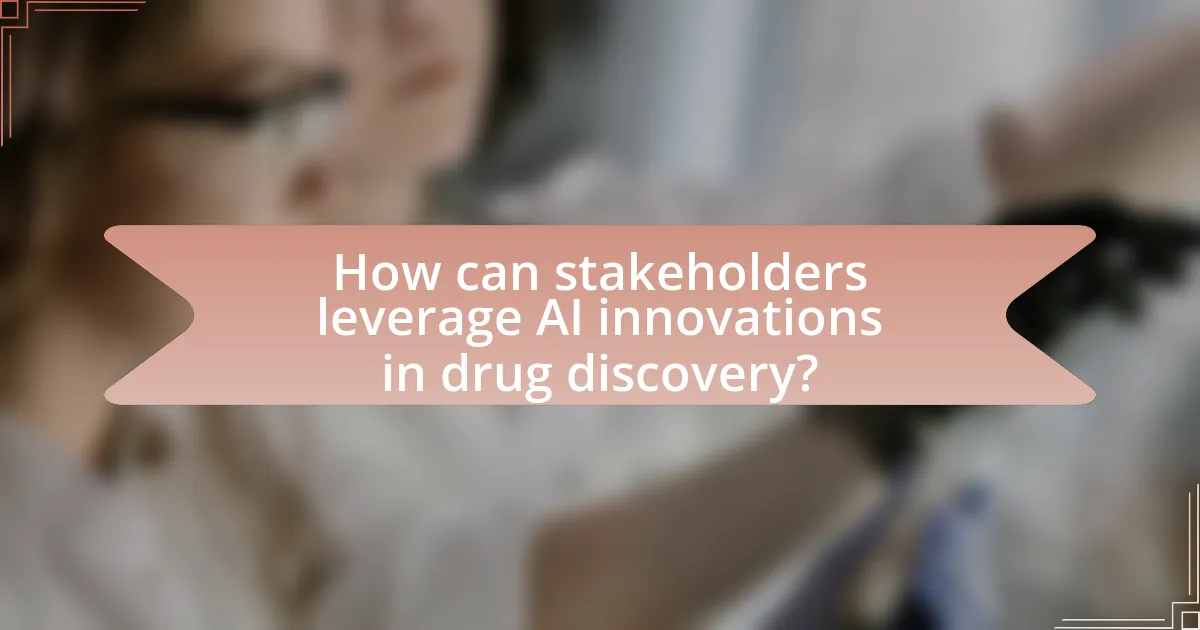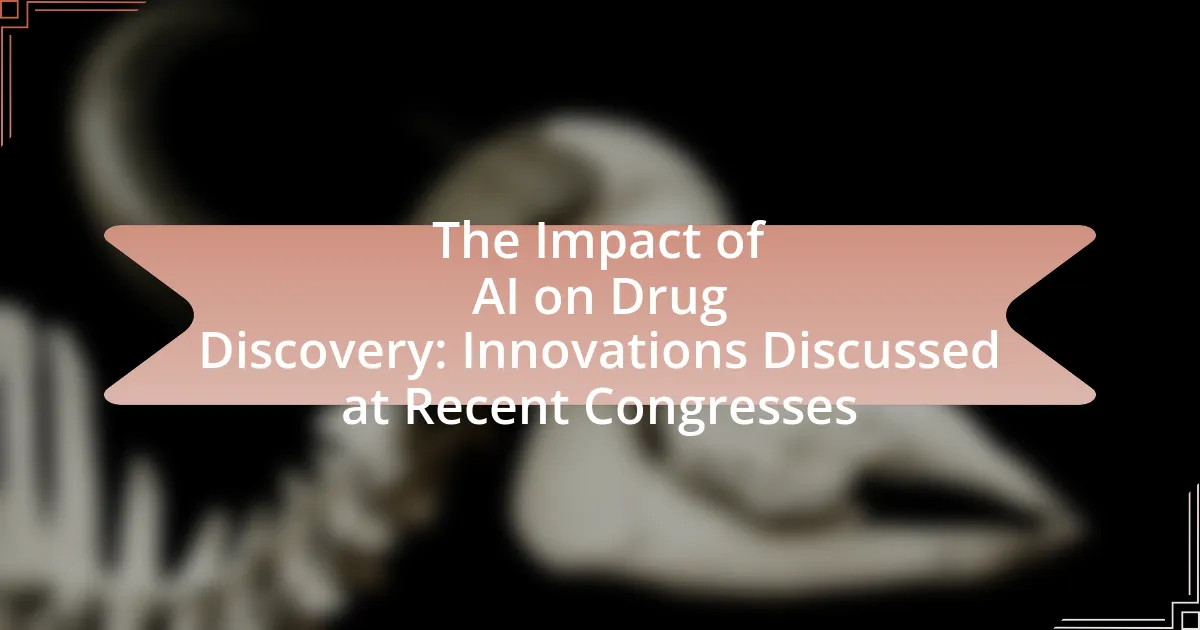The article focuses on the transformative impact of artificial intelligence (AI) on drug discovery, highlighting innovations discussed at recent congresses. It details how AI technologies, including machine learning and natural language processing, significantly accelerate the identification and development of new therapeutics by analyzing vast datasets. Key advancements such as predictive modeling, generative models for compound design, and the integration of AI into existing workflows are examined, alongside challenges like data quality and ethical considerations. The article emphasizes the potential of AI to reduce drug development timelines and costs while improving the accuracy of predictions regarding drug efficacy and safety.

What is the Impact of AI on Drug Discovery?
The impact of AI on drug discovery is transformative, significantly accelerating the process of identifying and developing new therapeutics. AI algorithms analyze vast datasets, including genomic, proteomic, and clinical data, to predict drug interactions and optimize lead compounds. For instance, a study published in Nature Biotechnology demonstrated that AI can reduce the time required for drug discovery by up to 50%, leading to faster clinical trials and market entry. Additionally, AI-driven platforms like Atomwise and BenevolentAI have successfully identified promising drug candidates that traditional methods overlooked, showcasing AI’s ability to enhance precision and efficiency in drug development.
How is AI transforming the drug discovery process?
AI is transforming the drug discovery process by significantly accelerating the identification of potential drug candidates and optimizing their development. Machine learning algorithms analyze vast datasets, including genomic, proteomic, and clinical data, to predict how different compounds will interact with biological targets. For instance, a study published in Nature Biotechnology demonstrated that AI models could reduce the time required for drug discovery from years to just months, with companies like Atomwise using deep learning to screen millions of compounds rapidly. This efficiency not only lowers costs but also increases the likelihood of successful outcomes in clinical trials, as evidenced by the faster progression of AI-assisted drug candidates through various phases of development.
What specific AI technologies are being utilized in drug discovery?
Specific AI technologies utilized in drug discovery include machine learning, deep learning, natural language processing, and reinforcement learning. Machine learning algorithms analyze large datasets to identify potential drug candidates by predicting molecular interactions and biological activity. Deep learning, a subset of machine learning, enhances the ability to model complex biological systems and optimize drug design through neural networks. Natural language processing is employed to extract valuable insights from scientific literature and clinical trial data, facilitating knowledge discovery. Reinforcement learning is used to optimize drug formulation and dosing strategies by simulating various scenarios and learning from outcomes. These technologies collectively enhance the efficiency and accuracy of the drug discovery process, leading to faster development of new therapeutics.
How does AI improve the efficiency of drug discovery?
AI improves the efficiency of drug discovery by accelerating the identification of potential drug candidates and optimizing their development processes. Machine learning algorithms analyze vast datasets, including genomic, proteomic, and clinical data, to predict how different compounds will interact with biological targets. For instance, a study published in Nature Reviews Drug Discovery highlighted that AI can reduce the time required for lead identification from years to just months, significantly speeding up the overall drug development timeline. Additionally, AI-driven simulations can predict drug efficacy and safety profiles, minimizing costly late-stage failures in clinical trials.
What are the key innovations in AI for drug discovery discussed at recent congresses?
Key innovations in AI for drug discovery discussed at recent congresses include the use of machine learning algorithms for predictive modeling, natural language processing for literature mining, and generative models for compound design. Machine learning algorithms have demonstrated significant improvements in predicting drug-target interactions, with studies showing up to 90% accuracy in certain applications. Natural language processing techniques have been employed to analyze vast amounts of scientific literature, enabling researchers to identify potential drug candidates more efficiently. Additionally, generative models, such as variational autoencoders, have been utilized to design novel compounds, leading to the discovery of new drug candidates that traditional methods may overlook. These innovations are transforming the drug discovery landscape by enhancing efficiency and accuracy in the identification and development of new therapeutics.
Which breakthroughs have been highlighted in recent AI drug discovery presentations?
Recent AI drug discovery presentations have highlighted breakthroughs such as the use of machine learning algorithms to predict molecular interactions and the application of generative models for drug design. These advancements enable researchers to identify potential drug candidates more efficiently and accurately. For instance, a study presented at the AI in Healthcare Summit demonstrated that AI-driven models could reduce the time required for drug discovery by up to 50%, showcasing the transformative potential of AI in accelerating the development of new therapeutics.
How are these innovations changing traditional drug development timelines?
Innovations in AI are significantly reducing traditional drug development timelines by streamlining processes such as target identification, lead optimization, and clinical trial design. For instance, AI algorithms can analyze vast datasets to identify potential drug targets more quickly than conventional methods, which can take years. A study published in Nature Reviews Drug Discovery highlighted that AI-driven approaches can decrease the time for lead optimization by up to 50%, allowing researchers to focus on the most promising candidates sooner. Additionally, AI enhances patient recruitment for clinical trials, which traditionally can be a lengthy process, by using predictive analytics to identify suitable participants more efficiently. This integration of AI technologies is transforming the drug development landscape, enabling faster delivery of new therapies to market.

What challenges does AI face in drug discovery?
AI faces several challenges in drug discovery, including data quality, interpretability, and integration with existing workflows. Data quality is critical, as AI models require large, high-quality datasets to make accurate predictions; however, many datasets are incomplete or biased, leading to unreliable outcomes. Interpretability is another significant challenge, as many AI algorithms, particularly deep learning models, operate as “black boxes,” making it difficult for researchers to understand how decisions are made. Additionally, integrating AI tools into existing drug discovery workflows poses logistical and technical hurdles, as researchers must adapt to new technologies while ensuring compliance with regulatory standards. These challenges hinder the full potential of AI in accelerating drug discovery processes.
What ethical considerations arise from using AI in drug discovery?
The ethical considerations arising from using AI in drug discovery include issues of bias, transparency, accountability, and patient consent. Bias can occur if the data used to train AI models is not representative, leading to unequal treatment outcomes. Transparency is crucial, as stakeholders need to understand how AI algorithms make decisions, which can be complex and opaque. Accountability is essential to determine who is responsible for errors or adverse effects resulting from AI-driven drug development. Additionally, obtaining informed consent from patients involved in clinical trials is necessary to ensure they understand how AI is utilized in the research process. These considerations are supported by discussions in literature, such as the report by the National Academies of Sciences, Engineering, and Medicine, which emphasizes the importance of ethical frameworks in AI applications in healthcare.
How do data privacy concerns impact AI applications in drug discovery?
Data privacy concerns significantly impact AI applications in drug discovery by limiting access to sensitive patient data necessary for training algorithms. Regulatory frameworks like GDPR impose strict guidelines on data usage, which can hinder the development of AI models that require large datasets for effective learning. For instance, a study published in the journal Nature Biotechnology highlights that the inability to share patient data across institutions can slow down the identification of drug candidates, as AI systems often rely on diverse datasets to improve accuracy and predictive capabilities. Consequently, these privacy regulations can lead to delays in research timelines and increased costs, ultimately affecting the speed at which new drugs are brought to market.
What biases can occur in AI algorithms used for drug discovery?
AI algorithms used for drug discovery can exhibit biases such as data bias, algorithmic bias, and confirmation bias. Data bias occurs when the training datasets are not representative of the diverse populations that the drugs will ultimately serve, leading to ineffective or harmful outcomes for underrepresented groups. Algorithmic bias arises from the design of the algorithms themselves, which may favor certain outcomes based on the assumptions made during development. Confirmation bias can influence researchers to favor results that align with their hypotheses, potentially overlooking critical data that contradicts their expectations. These biases can significantly impact the efficacy and safety of drug candidates, as evidenced by studies showing that underrepresented populations often experience disparities in drug response and adverse effects.
What technical limitations does AI encounter in drug discovery?
AI encounters several technical limitations in drug discovery, primarily related to data quality, interpretability, and computational power. The reliance on high-quality, diverse datasets is crucial, as AI models trained on biased or incomplete data can lead to inaccurate predictions and ineffective drug candidates. Additionally, the complexity of biological systems makes it challenging for AI to interpret results accurately, often resulting in models that lack transparency and explainability. Furthermore, the computational resources required for processing vast amounts of biological data can be prohibitive, limiting the scalability of AI applications in drug discovery. These limitations highlight the need for improved data management, enhanced model interpretability, and increased computational capabilities to fully leverage AI’s potential in this field.
How does the quality of data affect AI outcomes in drug discovery?
The quality of data significantly influences AI outcomes in drug discovery by determining the accuracy and reliability of predictive models. High-quality data, characterized by completeness, consistency, and relevance, enables AI algorithms to identify patterns and make informed predictions about drug efficacy and safety. For instance, a study published in Nature Reviews Drug Discovery highlights that datasets with high-quality annotations lead to improved model performance, resulting in a 30% increase in the success rate of drug candidates in clinical trials. Conversely, poor-quality data can lead to misleading results, increased costs, and failed drug development efforts, underscoring the critical role of data integrity in the AI-driven drug discovery process.
What are the challenges of integrating AI with existing drug discovery workflows?
Integrating AI with existing drug discovery workflows presents several challenges, including data quality, regulatory compliance, and the need for interdisciplinary collaboration. Data quality issues arise because AI systems require large, high-quality datasets for training, which may not be available or may be inconsistent across different sources. Regulatory compliance is critical, as AI-driven processes must adhere to stringent guidelines set by authorities like the FDA, which can slow down implementation. Additionally, successful integration necessitates collaboration between data scientists, biologists, and chemists, which can be hindered by differing terminologies and methodologies. These challenges highlight the complexities involved in merging advanced AI technologies with traditional drug discovery practices.

How can stakeholders leverage AI innovations in drug discovery?
Stakeholders can leverage AI innovations in drug discovery by utilizing machine learning algorithms to analyze vast datasets for identifying potential drug candidates more efficiently. These algorithms can predict molecular interactions and optimize lead compounds, significantly reducing the time and cost associated with traditional drug discovery processes. For instance, a study published in Nature Reviews Drug Discovery highlights that AI can decrease the drug development timeline by up to 30% and cut costs by approximately 50%, demonstrating its effectiveness in accelerating the discovery of new therapeutics.
What strategies can pharmaceutical companies adopt to implement AI effectively?
Pharmaceutical companies can adopt several strategies to implement AI effectively, including investing in data infrastructure, fostering cross-disciplinary collaboration, and prioritizing regulatory compliance. Investing in robust data infrastructure ensures that companies can collect, store, and analyze large datasets, which is crucial for training AI models. For instance, companies like Novartis have established data lakes to facilitate data integration from various sources, enhancing AI model accuracy. Cross-disciplinary collaboration between data scientists, pharmacologists, and clinicians can lead to innovative AI applications tailored to drug discovery. Additionally, prioritizing regulatory compliance helps ensure that AI applications meet industry standards, as seen in the FDA’s guidance on AI in healthcare, which emphasizes the importance of transparency and validation in AI algorithms. These strategies collectively enhance the effectiveness of AI in pharmaceutical applications.
How can collaboration between AI developers and pharmaceutical researchers enhance drug discovery?
Collaboration between AI developers and pharmaceutical researchers can significantly enhance drug discovery by leveraging advanced algorithms to analyze vast datasets, thereby identifying potential drug candidates more efficiently. AI technologies, such as machine learning and natural language processing, enable researchers to predict molecular interactions and optimize drug design, reducing the time and cost associated with traditional methods. For instance, a study published in Nature Reviews Drug Discovery highlighted that AI-driven approaches can decrease the drug development timeline by up to 30%, showcasing the tangible benefits of integrating AI into pharmaceutical research. This synergy not only accelerates the discovery process but also improves the accuracy of predictions regarding drug efficacy and safety, ultimately leading to more successful therapeutic outcomes.
What best practices should be followed when adopting AI technologies in drug discovery?
When adopting AI technologies in drug discovery, organizations should prioritize data quality, interdisciplinary collaboration, and regulatory compliance. High-quality, diverse datasets enhance the accuracy of AI models, as demonstrated by studies showing that data quality directly impacts model performance. Interdisciplinary collaboration among biologists, chemists, and data scientists fosters innovative solutions and ensures that AI tools are effectively integrated into existing workflows. Additionally, adhering to regulatory guidelines, such as those from the FDA, is crucial for ensuring that AI-driven discoveries meet safety and efficacy standards, as evidenced by the increasing scrutiny of AI applications in clinical settings.
What future trends in AI could shape drug discovery?
Future trends in AI that could shape drug discovery include the integration of machine learning algorithms for predictive modeling, advancements in natural language processing for literature mining, and the use of generative models for compound design. Machine learning algorithms can analyze vast datasets to predict drug interactions and efficacy, significantly reducing the time and cost associated with traditional drug discovery methods. Natural language processing enables researchers to extract relevant information from scientific literature and clinical trial data, facilitating more informed decision-making. Generative models, such as those developed by DeepMind, can create novel molecular structures with desired properties, enhancing the efficiency of the drug design process. These trends are supported by ongoing research and development in AI technologies, which are increasingly being adopted in pharmaceutical companies to streamline drug discovery workflows.
How might advancements in machine learning influence drug discovery in the next decade?
Advancements in machine learning are expected to significantly enhance drug discovery in the next decade by improving the efficiency and accuracy of identifying potential drug candidates. Machine learning algorithms can analyze vast datasets, including genomic, proteomic, and clinical data, to uncover patterns that traditional methods may overlook. For instance, a study published in Nature Reviews Drug Discovery highlights that machine learning models can predict molecular interactions and optimize drug design, potentially reducing the time required for drug development by up to 50%. Additionally, machine learning can facilitate personalized medicine by enabling the identification of patient-specific treatment options based on genetic profiles, thereby increasing the likelihood of successful outcomes.
What role will regulatory bodies play in the future of AI in drug discovery?
Regulatory bodies will play a crucial role in ensuring the safe and effective integration of AI in drug discovery. They will establish guidelines and frameworks to evaluate AI algorithms, ensuring that they meet safety, efficacy, and ethical standards. For instance, the FDA has already begun to outline pathways for the approval of AI-driven tools, emphasizing the need for transparency and validation of AI models used in clinical settings. This regulatory oversight will help mitigate risks associated with AI, such as biases in data or algorithmic errors, thereby fostering public trust and encouraging innovation in the pharmaceutical industry.
What practical steps can researchers take to stay updated on AI innovations in drug discovery?
Researchers can stay updated on AI innovations in drug discovery by regularly attending relevant conferences, subscribing to specialized journals, and participating in online forums and webinars. Attending conferences such as the American Association of Pharmaceutical Scientists (AAPS) Annual Meeting provides insights into the latest research and networking opportunities with industry leaders. Subscribing to journals like “Nature Biotechnology” and “Journal of Medicinal Chemistry” ensures access to peer-reviewed articles detailing cutting-edge AI applications in drug discovery. Additionally, engaging in online platforms like ResearchGate and LinkedIn groups focused on AI in pharmaceuticals allows researchers to exchange knowledge and stay informed about emerging trends and technologies.


